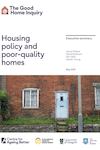“It’s clear that we are facing a serious crisis in the quality of England’s housing stock, the oldest in Europe, with around ten million people living in homes that don’t meet basic standards of decency.
“This report shows that while in theory there is a national framework in place to keep homes up to a decent standard, a lack of action and funding has let this fall by the wayside.
“As the government moves forward with its ambition to decarbonise homes, attempting to address energy efficiency in isolation would be a big mistake. Instead, all the elements of a good home should be addressed through a holistic retrofit strategy.
“The government must ensure that improving England’s housing stock is part of a co-ordinated effort to improve the quality of all our homes – so that no-one is forced to live in a house that is cold, damp or inaccessible.”

